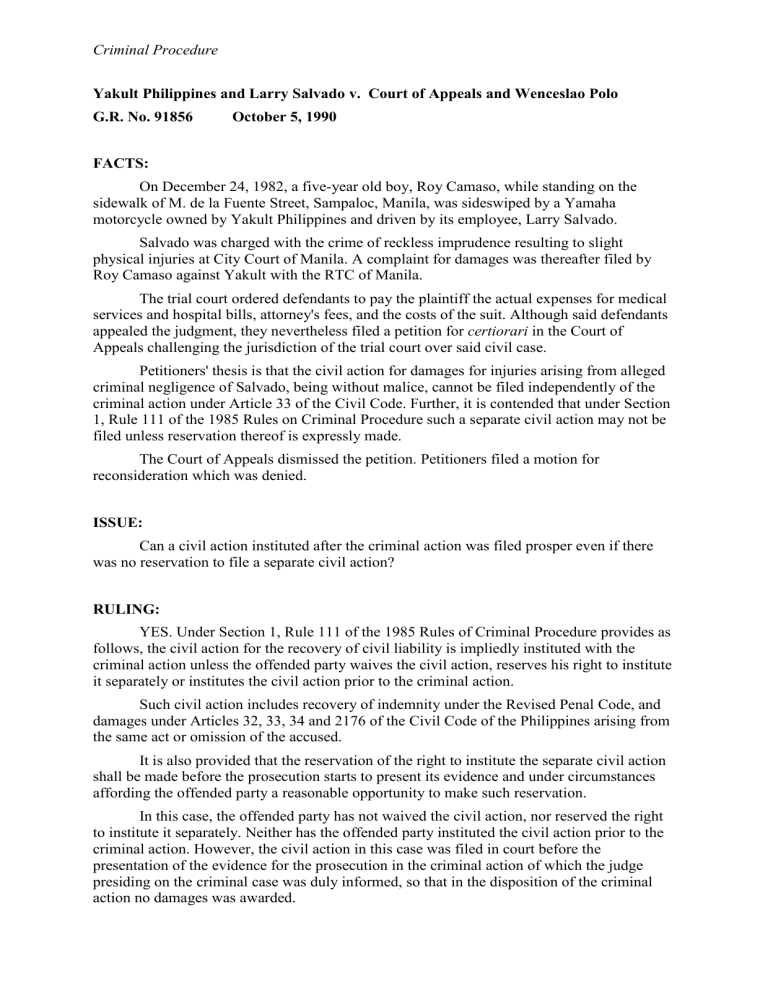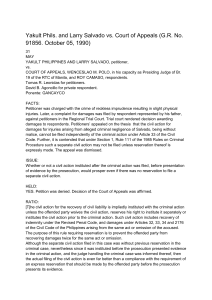111 Yakult Philippines and Larry Salvado v. Court of Appeals and Wenceslao Polo
advertisement

Criminal Procedure Yakult Philippines and Larry Salvado v. Court of Appeals and Wenceslao Polo G.R. No. 91856 October 5, 1990 FACTS: On December 24, 1982, a five-year old boy, Roy Camaso, while standing on the sidewalk of M. de la Fuente Street, Sampaloc, Manila, was sideswiped by a Yamaha motorcycle owned by Yakult Philippines and driven by its employee, Larry Salvado. Salvado was charged with the crime of reckless imprudence resulting to slight physical injuries at City Court of Manila. A complaint for damages was thereafter filed by Roy Camaso against Yakult with the RTC of Manila. The trial court ordered defendants to pay the plaintiff the actual expenses for medical services and hospital bills, attorney's fees, and the costs of the suit. Although said defendants appealed the judgment, they nevertheless filed a petition for certiorari in the Court of Appeals challenging the jurisdiction of the trial court over said civil case. Petitioners' thesis is that the civil action for damages for injuries arising from alleged criminal negligence of Salvado, being without malice, cannot be filed independently of the criminal action under Article 33 of the Civil Code. Further, it is contended that under Section 1, Rule 111 of the 1985 Rules on Criminal Procedure such a separate civil action may not be filed unless reservation thereof is expressly made. The Court of Appeals dismissed the petition. Petitioners filed a motion for reconsideration which was denied. ISSUE: Can a civil action instituted after the criminal action was filed prosper even if there was no reservation to file a separate civil action? RULING: YES. Under Section 1, Rule 111 of the 1985 Rules of Criminal Procedure provides as follows, the civil action for the recovery of civil liability is impliedly instituted with the criminal action unless the offended party waives the civil action, reserves his right to institute it separately or institutes the civil action prior to the criminal action. Such civil action includes recovery of indemnity under the Revised Penal Code, and damages under Articles 32, 33, 34 and 2176 of the Civil Code of the Philippines arising from the same act or omission of the accused. It is also provided that the reservation of the right to institute the separate civil action shall be made before the prosecution starts to present its evidence and under circumstances affording the offended party a reasonable opportunity to make such reservation. In this case, the offended party has not waived the civil action, nor reserved the right to institute it separately. Neither has the offended party instituted the civil action prior to the criminal action. However, the civil action in this case was filed in court before the presentation of the evidence for the prosecution in the criminal action of which the judge presiding on the criminal case was duly informed, so that in the disposition of the criminal action no damages was awarded. Criminal Procedure Although the separate civil action filed in this case was without previous reservation in the criminal case, nevertheless since it was instituted before the prosecution presented evidence in the criminal action, and the judge handling the criminal case was informed thereof, then the actual filing of the civil action is even far better than a compliance with the requirement of an express reservation that should be made by the offended party before the prosecution presents its evidence. The purpose of this rule requiring reservation is to prevent the offended party from recovering damages twice for the same act or omission. Thus, the Court finds and so holds that the trial court had jurisdiction over the separate civil action brought before it.

